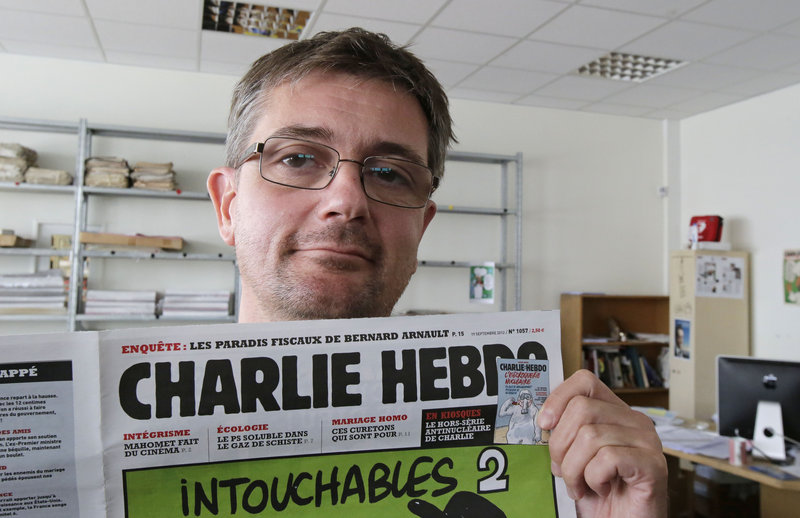PARIS – France stepped up security Wednesday at its embassies across the Muslim world after a French satirical weekly revived a formula that it has already used to capture attention: Publishing crude, lewd caricatures of Islam’s Prophet Muhammad.
Wednesday’s issue of the provocative satirical weekly Charlie Hebdo, whose offices were firebombed last year, raised concerns that France could face violent protests like the ones targeting the United States over an amateur video produced in California that have left at least 30 people dead.
The drawings, some of which depicted Muhammad naked and in demeaning or pornographic poses, were met with a swift rebuke by the French government, which warned the magazine could be inflaming tensions, even as it reiterated France’s free speech protections.
The principle of freedom of expression “must not be infringed,” Foreign Minister Laurent Fabius said, speaking on France Inter radio.
But he added: “Is it pertinent, intelligent, in this context to pour oil on the fire? The answer is no.”
Anger over the film “Innocence of Muslims” has fueled violent protests from Asia to Africa. In the Lebanese port city of Tyre, tens of thousands of people marched in the streets Wednesday, chanting “Oh, America, you are God’s enemy!”
Worried France might be targeted, the government ordered its embassies, cultural centers, schools and other official sites to close on Friday – the Muslim holy day – in 20 countries. It also immediately shut down its embassy and the French school in Tunisia, the site of deadly protests at the U.S. Embassy last week.
The French Foreign Ministry issued a travel warning urging French citizens in the Muslim world to exercise “the greatest vigilance,” avoiding public gatherings and “sensitive buildings.”
The controversy could prove tricky for France, which has struggled to integrate its Muslim population, Western Europe’s largest. Many Muslims believe the Prophet Muhammad should not be depicted at all – even in a flattering way – because it might encourage idolatry.
Violence provoked by the anti-Islam video, which portrays the prophet as a fraud, womanizer and child molester, began with a Sept. 11 attack on the U.S. Embassy in Cairo, then quickly spread to Libya, where an attack on the U.S. Consulate in Benghazi left the U.S. ambassador and three other Americans dead.
In Washington, White House spokesman Jay Carney said the Obama administration believed the French magazine images “will be deeply offensive to many and have the potential to be inflammatory.”
“We don’t question the right of something like this to be published,” he said, pointing to the U.S. Constitution’s protections of free expression. “We just question the judgment behind the decision to publish it.”
In a statement, Arab League chief Nabil Elarabi called the cartoons “provocative and disgraceful” and said their publication added complexity to an already inflamed situation. He said the drawings arose from ignorance of “true Islam and its holy prophet.”
A lawsuit was filed against Charlie Hebdo hours after the issue hit newsstands, the Paris prosecutor’s office said, though it would not say who filed it. The magazine also said its website had been hacked.
Riot police took up positions outside the magazine’s offices, which were firebombed last year after it released an edition that mocked radical Islam.
Chief editor Stephane Charbonnier, who publishes under the pen name “Charb” and has been under police protection for a year, defended the cartoons.
“Muhammad isn’t sacred to me,” he told The Associated Press.
“I don’t blame Muslims for not laughing at our drawings. I live under French law. I don’t live under Quranic law.”
He said he had no regrets and felt no responsibility for any violence.
“I’m not the one going into the streets with stones and Kalashnikovs,” he said. “We’ve had 1,000 issues and only three problems, all after front pages about radical Islam.”
The cartoonist, who goes by the name Luz, also was defiant.
“We treat the news like journalists. Some use cameras, some use computers. For us, it’s a paper and pencil,” he said.
“A pencil is not a weapon. It’s just a means of expression.”
Copy the Story Link
Send questions/comments to the editors.



Success. Please wait for the page to reload. If the page does not reload within 5 seconds, please refresh the page.
Enter your email and password to access comments.
Hi, to comment on stories you must . This profile is in addition to your subscription and website login.
Already have a commenting profile? .
Invalid username/password.
Please check your email to confirm and complete your registration.
Only subscribers are eligible to post comments. Please subscribe or login first for digital access. Here’s why.
Use the form below to reset your password. When you've submitted your account email, we will send an email with a reset code.